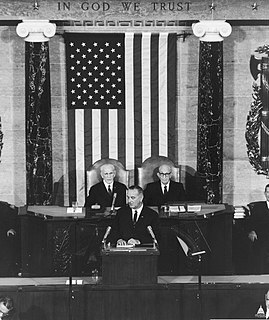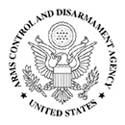
James Earl Carter Jr. is an American former politician who served as the 39th president of the United States from 1977 to 1981. A member of the Democratic Party, he previously served as the 76th governor of Georgia from 1971 to 1975 and as a Georgia state senator from 1963 to 1967. Since leaving office, Carter has remained engaged in political and social projects, receiving the Nobel Peace Prize in 2002 for his humanitarian work.

The Mutual Security Act of 1951 launched a major American foreign aid program, 1951–61, of grants to numerous countries. It largely replaced the Marshall Plan. The main goal was to help poor countries develop and to contain the spread of communism. It was signed on October 10, 1951, by President Harry S. Truman. Annual authorizations were about $7.5 billion, out of a GDP of $340bn in 1951, for military, economic, and technical foreign aid to American allies. The aid was aimed primarily at shoring up Western Europe, as the Cold War developed. In 1961 it was replaced by new foreign aid program. The Foreign Assistance Act of 1961, created the Agency for International Development (AID), which focused more on Latin America.
The Nixon Doctrine was put forth during a press conference in Guam on July 25, 1969 by President of the United States Richard Nixon and later formalized in his speech on Vietnamization of the Vietnam War on November 3, 1969. According to Gregg Brazinsky, author of "Nation Building in South Korea: Koreans, Americans, and the Making of a Democracy", Nixon stated that "the United States would assist in the defense and developments of allies and friends", but would not "undertake all the defense of the free nations of the world." This doctrine meant that each ally nation was in charge of its own security in general, but the United States would act as a nuclear umbrella when requested. The Doctrine argued for the pursuit of peace through a partnership with American allies.

The United States presidential line of succession is the order in which the vice president of the United States becomes president of the United States or assumes the presidential powers and duties, via the president's death, resignation, removal from office or incapacity. Officials of the United States federal government assume the powers and duties of the presidency, if the president and vice president both become incapacitated, die, resign, or are removed from office, simultaneously.

The National Advisory Commission on Civil Disorders, known as the Kerner Commission after its chair, Governor Otto Kerner Jr. of Illinois, was an 11-member Presidential Commission established by President Lyndon B. Johnson in Executive Order 11365 to investigate the causes of the long, hot summer of 1967 in the United States and to provide recommendations for the future.

The Johnson Doctrine, enunciated by U.S. President Lyndon B. Johnson after the United States' intervention in the Dominican Republic in 1965, declared that domestic revolution in the Western Hemisphere would no longer be a local matter when the object is the establishment of a "Communist dictatorship". It is an extension of the Eisenhower and Kennedy doctrines.

The U.S. Arms Control and Disarmament Agency (ACDA) was an independent agency of the United States government that existed from 1961 to 1999. Its mission was to strengthen United States national security by "formulating, advocating, negotiating, implementing and verifying effective arms control, nonproliferation, and disarmament policies, strategies, and agreements."
The Wage Stabilization Board (WSB) was an independent agency of the United States government whose function was to make wage control policy recommendations and to implement such wage controls as were approved. There were two agencies with the same name. The first, the National Wage Stabilization Board, was the successor to the National War Labor Board, and existed from January 1, 1946, to February 24, 1947. The second, the Wage Stabilization Board, was a part of the Office of Defense Mobilization and existed from September 9, 1950, to February 6, 1953.

Donald Randall Richberg was an American attorney, civil servant, and author who was one of President Franklin D. Roosevelt's key aides and who played a critical role in the New Deal. He co-wrote the National Industrial Recovery Act, was general counsel and executive director of the National Recovery Administration. He also co-authored the Railway Labor Act, the Norris-LaGuardia Act, and the Taft-Hartley Act.
The Federal Works Agency (FWA) was an independent agency of the federal government of the United States which administered a number of public construction, building maintenance, and public works relief functions and laws from 1939 to 1949. Along with the Federal Security Agency and Federal Loan Agency, it was one of three catch-all agencies of the federal government pursuant to reorganization plans authorized by the Reorganization Act of 1939, the first major, planned reorganization of the executive branch of the government of the United States since 1787.

The Farm Labor Contractor Registration Act (FLCRA) — P.L. 88-582 — regulated the activities of farm labor contractors, that is, agents who recruit and are otherwise engaged in the transport, housing, and employment of migratory agricultural workers. Under FLCRA, farm labor contractors were required to secure certification through the United States Department of Labor.

The White House Initiative on Educational Excellence for Hispanics is a multi-agency working group within the Department of Education charged with strengthening the nation's capacity to provide high quality education while increasing opportunities for Hispanic American participation in federal education programs. In addition, the Initiative serves as a resource for information related to closing the educational achievement gap for Hispanic Americans. Finally, the Initiative provides staffing to support and coordinate the mission of a President's Advisory Commission on Educational Excellence for Hispanics.

The Displaced Persons Act of 1948 authorized for a limited period of time the admission into the United States of 200,000 certain European displaced persons (DPs) for permanent residence.

Education Amendments of 1972 also sometimes known as the Higher Education Amendments of 1972, was U.S. legislation enacted June 23, 1972. It is best known for its Title IX, which prohibited discrimination on the basis of sex in educational institutions receiving federal aid. It also modified government programs providing financial aid to students by directing monies directly to students without the participation of intermediary financial institutions.
The U.S. National Commission on Fire Prevention and Control was a Presidential Commission appointed by President Richard Nixon in June 1971. It submitted its final report, America Burning, in May 1973.
The National War Labor Board, commonly the War Labor Board was an agency of the United States government established January 12, 1942 by executive order to mediate labor disputes during World War II.

The National Advisory Committee for Women (NACW) was a presidential commission established by President Jimmy Carter in 1978. It was renamed the President's Advisory Committee for Women (PACFW), with a reduced mandate, in 1979.

Passport Act of 1920 or Passport Control Act, 1920 was a federal statute authored by the United States 66th Congress. The legislation was an appropriations bill allocating a fiscal budget for the United States Diplomatic and Consular Service.








